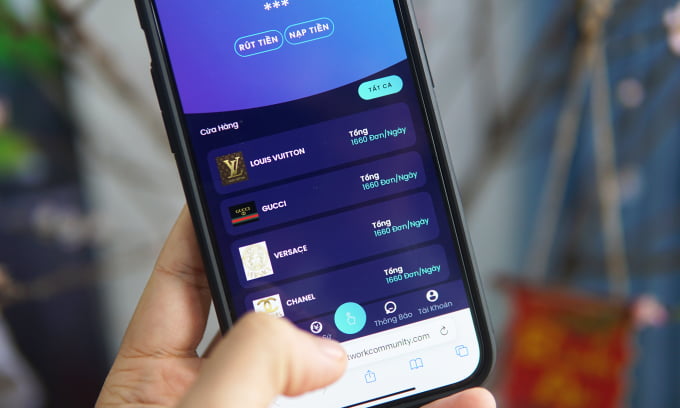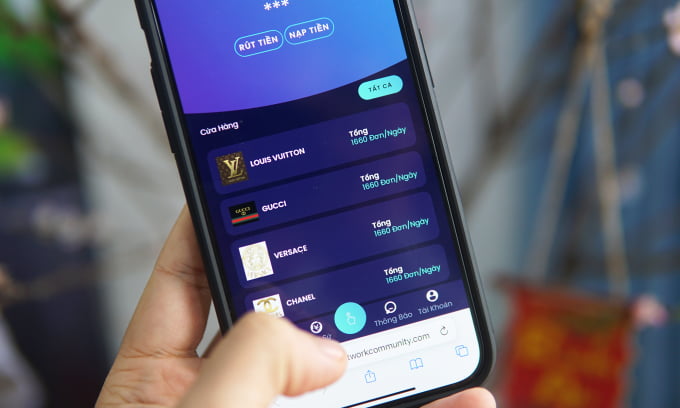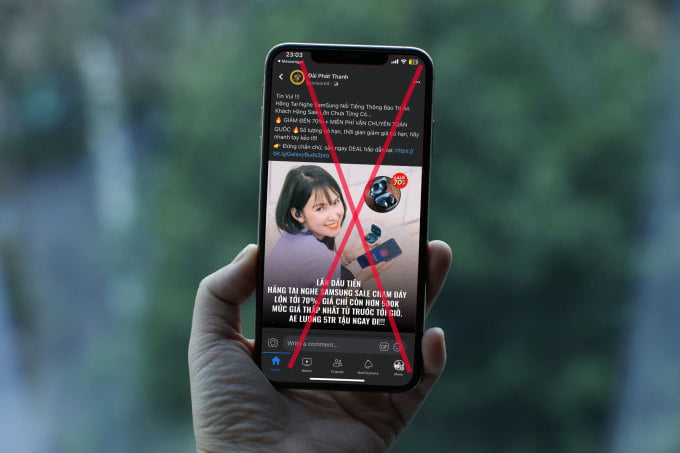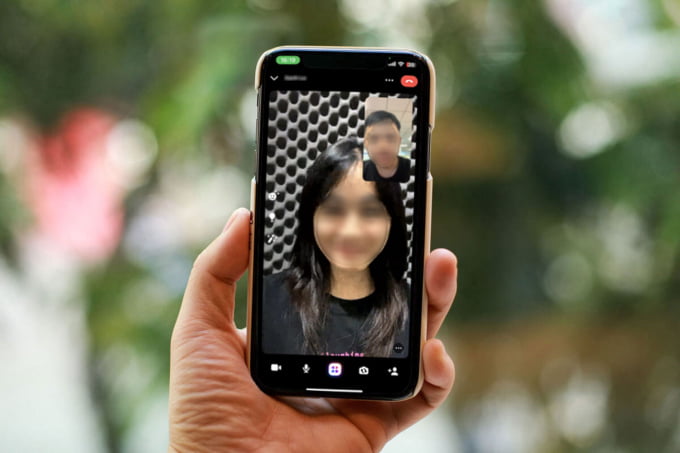
According to statistics from the Department of Information Security – Ministry of Information and Communications, online fraud in Vietnam increased by 64.78% in the first six months of the year compared to the same period last year and increased by 37.62% compared to the previous year. second half of 2022. In the last months of the year, cybercriminals continue to deploy a series of modern technology methods and applications, causing great damage to network users.
Recruit online collaborators
Fraud groups approach victims with advertisements recruiting collaborators on social networks. Initially, they asked participants to complete simple tasks such as watching YouTube or following Facebook accounts to receive small cash rewards. The victim is then instructed to join a closed Telegram group and must pay money to receive higher tasks and large rewards. But when the user wants to withdraw money, the fraud group uses the excuse of an error operation or a problem with the banking app to request additional payment for processing. Afraid of losing their accumulated assets, many people transferred tens of millions to billions of dong to the bad guys before discovering they had been scammed.

Interface of a task application for online collaborators. Photo: Luu Quy
The Anti-Fraud Project said the system received dozens of calls for help from victims in just two weeks of January. In March, Hanoi Police also recorded many cases of losing money due to similar methods. Typically, a person was defrauded of 400 million VND while on a mission to increase Facebook interactions and a woman lost 2.5 billion VND for collaborating on placing orders on a fake Tiki platform.
Although authorities continuously warn about scams, even sending text messages to people’s phone numbers, cases of falling into traps still occur throughout the year.
Impersonating authorities or service providers
Many fraud groups pretend to be police, courts, tax departments, post offices, electricity… to text, call, and spread false information to pressure victims into transferring money or revealing information themselves. Important personal information.
This trick has been around for a long time but flourished this year. In April, Ho Chi Minh City Police recorded a case of losing 15 billion VND due to believing the words of an impersonator who impersonated a police general and contacted him to investigate a drug case. In September, Hai Phong Police said a 71-year-old citizen lost 1.3 billion VND to a similar scam.
Previously, in May, the Northern Power Corporation had to issue a warning about a series of fake calls, threatening to cut off power after two hours if users did not provide personal information to compare contracts. The bad guys also impersonate the network operator and the Department of Telecommunications , threatening to block the subscriber to ask the victim to declare their CCCD number, date of birth…
Faced with the outbreak of this impersonation problem, the Ministry of Information and Communications is implementing the issuance of voice brandnames for phone numbers of authorities and organizations, and at the same time tightening subscriber registration. mobile phone, limit junk SIM cards.
Advertise headphones for 70% off
Since the beginning of October, Facebook users have been “terrorized” by a series of ads for Marshall, Samsung headphones … reduced by 70%, from 2.59 million VND to 549 thousand VND. Bad guys also impersonate many famous fanpages to simultaneously run ads, making users mistakenly think that the headphone company actually has a year-end promotion campaign, falling into the trap of buying fake, poor quality products at high prices.

Advertising discounted headphones on a fake Facebook page, Photo: Khuong Nha
On December 19, the General Department of Market Management – Ministry of Industry and Trade said it had destroyed a large-scale warehouse of fake Marshall brand goods, containing more than 10,000 products with a total value of nearly 4.4 billion VND in Tay Ho district. Many of these samples are being packaged and labeled with fake labels to be shipped to online buyers.
Experts advise users to be cautious when they see products priced too cheaply compared to normal to avoid falling into traps. Brands should also proactively detect images and videos of their products being used by other parties for fraudulent purposes to take timely measures.
Fake transfer bill via banking app
Taking advantage of the cashless payment trend, bad guys have used tools and websites specializing in fake transfer invoices . In just a few minutes, they have a “transfer bill” in hand with the same interface, font and amount as the information in the banking application. Sellers will be deceived if they only look at the content “transfer successfully” without checking the balance fluctuation.

Interface of a website that creates fake payment bills. Photo: Luu Quy
In early October, Kim Ma Ward Police, Hanoi, said they discovered a person using a fake transfer bill to buy a phone worth 34 million VND. In July, Da Nang Police also prosecuted a person who stole 300 million VND from a fashion shop in a similar way. In mid-April, a ring specializing in fraudulent transfer bills was also busted by Hai Duong Police. The fraud group said there will be one person pretending to buy goods but not bringing money, and one person at home making a fake money transfer screen. The group often chooses stores with young owners to ensure they have a bank account and accept online payments.
Deepfake scam
Deepfake scams are on the rise with the explosion of artificial intelligence. Deepfake is a combination of deep learning and fake, using AI to quickly swap and merge one person’s face into another person’s body naturally, creating videos that look real.

A person is receiving a video call on the phone. Photo: Khuong Nha
Bad guys will try to take over users’ social network accounts, then use deepfake to fake voices, images, videos… and call the victim’s friends and relatives to borrow money. They will create scenarios of accidents or incidents that require urgent money to convince the victim’s relatives to transfer money.
According to Mr. Ngo Tan Vu Khanh, security consultant at Kaspersky, signs of suspicious calls are that they usually take place in a short time, images and sounds are flickering, faces are asymmetrical, eye movements and unnatural mouth shape. When receiving calls related to sensitive information or issues, especially needing to transfer money, users need to be alert to check and call relevant parties to confirm, avoiding falling into the trap.
Support to recover money for victims of fraud
Playing on the scammer’s psychology of wanting to get their property back, bad guys pretend to be lawyers , cyber security experts… to get acquainted and find ways to trick the victim again. They often look for victims in groups that share anti-fraud experiences, then claim to have special services to recover money. However, when the victim transferred the service fee, they immediately cut off contact.

A message from a group pretending to be a lawyer, announcing “can disburse” the lost money, was sent to users. Screenshots
In some cases, scammers claim to be white hat hackers, luring victims to deposit money to trade on the forex or stock exchange, with a commitment to algorithmic intervention to help players win and get back the money they were defrauded in advance. there. However, these exchanges only allow deposits and cannot be withdrawn.
According to experts from the Anti-Fraud project, money appropriated by cybercriminals is often difficult to recover because they know how to remain anonymous and use fake phone numbers and bank accounts. Instead of trusting the words of strangers, victims should notify the authorities for appropriate solutions.
Hoang Giang

Leave a Reply
You must be logged in to post a comment.